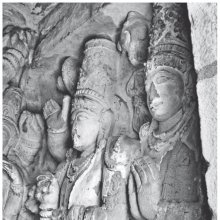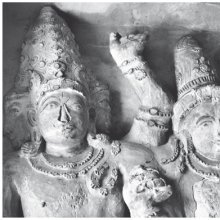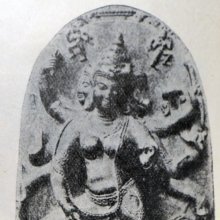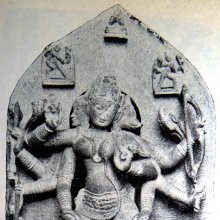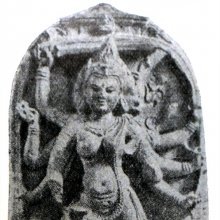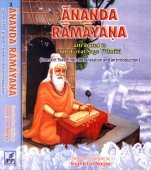Pay: 12 definitions
Introduction:
Pay means something in Hinduism, Sanskrit, the history of ancient India, Hindi, Tamil. If you want to know the exact meaning, history, etymology or English translation of this term then check out the descriptions on this page. Add your comment or reference to a book if you want to contribute to this summary article.
Images (photo gallery)
India history and geography
Source: Shodhganga: Vernacular architecture of Assam with special reference to Brahmaputra ValleyPay is a Tai Khamti term referring to “purlin”.—It appears in the study dealing with the vernacular architecture (local building construction) of Assam whose rich tradition is backed by the numerous communities and traditional cultures.

The history of India traces the identification of countries, villages, towns and other regions of India, as well as mythology, zoology, royal dynasties, rulers, tribes, local festivities and traditions and regional languages. Ancient India enjoyed religious freedom and encourages the path of Dharma, a concept common to Buddhism, Hinduism, and Jainism.
Languages of India and abroad
Sanskrit dictionary
Source: DDSA: The practical Sanskrit-English dictionaryPay (पय्).—1 Ā. (payate) To go, move.
Source: Cologne Digital Sanskrit Dictionaries: Shabda-Sagara Sanskrit-English DictionaryPay (पय्).—[paya] r. 1. st. cl. (payate) To go, to move. bhvā0 ātma0 saka0 seṭ .
Source: Cologne Digital Sanskrit Dictionaries: Cappeller Sanskrit-English DictionaryPāy (पाय्).—pāyate cacare.
Source: Cologne Digital Sanskrit Dictionaries: Monier-Williams Sanskrit-English Dictionary1) Pay (पय्):—[class] 1. [Ātmanepada] payate, to go, move, [Dhātupāṭha xiv, 3.]
2) Pāy (पाय्):—[class] 1. [Ātmanepada] pāyayate, to void excrement, [Praśna-upaniṣad iv, 2.]
Source: Cologne Digital Sanskrit Dictionaries: Yates Sanskrit-English DictionaryPay (पय्):—(ṅa) payate 1. d. To go.
[Sanskrit to German]
Sanskrit, also spelled संस्कृतम् (saṃskṛtam), is an ancient language of India commonly seen as the grandmother of the Indo-European language family (even English!). Closely allied with Prakrit and Pali, Sanskrit is more exhaustive in both grammar and terms and has the most extensive collection of literature in the world, greatly surpassing its sister-languages Greek and Latin.
Hindi dictionary
Source: DDSA: A practical Hindi-English dictionaryPay in Hindi refers in English to:—([i])[riya] (nm) pyorrhoea..—pay (पाय) is alternatively transliterated as Pāya.
...
Kannada-English dictionary
Source: Alar: Kannada-English corpusPāy (ಪಾಯ್):—
1) [verb] to jump over; to step over.
2) [verb] to throw oneself down;to jump down.
3) [verb] to beat rapidly or flutter (as the heart).
4) [verb] to discharge; to emit.
5) [verb] to cross over (as a stream, river, etc.).
6) [verb] to collide or dash against.
7) [verb] to strike out at with physical or military force; to assault; to attack.
8) [verb] to encircle, envelop; to surround.
9) [verb] to keep control over another’s mind, thought, behaviour, etc.; to possess (said of evil spirits).
10) [verb] to rush forward or toward.
11) [verb] to wander; to go to and fro.
12) [verb] to pierce (as with the horns) or to give a heavy push with the head.
13) [verb] to disperse, diffuse onself all over; to spread oneself over a wide area.
14) [verb] to creep in.
15) [verb] to stretch one’s hand.
16) [verb] to run away; to escape.
17) [verb] to come out from within.
18) [verb] to happen; to occur.
19) [verb] to come, move or pass swiftly and suddenly; to be seen or realised instantly.
--- OR ---
Pāy (ಪಾಯ್):—
1) [noun] the act of moving, going.
2) [noun] a manner, mode; a way.
3) [noun] appropriateness; propriety; fitness.
4) [noun] an act or instance crossing over.
5) [noun] any of the shaped sheets of canvas or other strong material spread to catch or deflect the wind, by means of which some vessels are driven forward; sail.
6) [noun] a vessel having such a sail.
Kannada is a Dravidian language (as opposed to the Indo-European language family) mainly spoken in the southwestern region of India.
Tamil dictionary
Source: DDSA: University of Madras: Tamil LexiconPāy (பாய்) [pāytal] 4 intransitive verb [K. pay.]
1. To spring, leap, bound, gallop, prance; தாவுதல். தண்கடற் றிரைமிசைப் பாயுந்து [thavuthal. thankadar riraimisaip payunthu] (புறநானூறு [purananuru] 24).
2. To flow, issue or gush out, as blood or stream; to rush down, as a waterfall; நீர் முதலியன வேகமாய்ச் செல்லுதல். வெள்ளநீர் பரந்து பாயும் [nir muthaliyana vegamays selluthal. vellanir paranthu payum] (நாலாயிர திவ்யப்பிரபந்தம் திருமாலை [nalayira thivyappirapandam thirumalai], 29).
3. To jump down, as from a hill; மேனின்று குதித்தல். வரைபாய்த னன்று [meninru kuthithal. varaipaytha nanru] (நாலடியார் [naladiyar], 369).
4. To plunge, dive, as into water; நீருண் மூழ்குதல். பங்கயப் பூம்புனல் பாய்ந்தாடு [nirun muzhkuthal. pangayap pumbunal paynthadu] (திருவாசகம் [thiruvasagam] 7, 13).
5. To move towards, as the needle attracted by a loadstone; எதிர் செல்லுதல். [ethir selluthal.]
6. To spread, as water, darkness; to radiate, as light; to extend; பரவுதல். [paravuthal.] (தொல். சொல். [thol. sol.] 361.)
7. To settle or fasten on, as the light, the mind, the imagination; விரைந்து படிதல் மனம் அங்கே பாய்ந்தது. [virainthu padithal manam ange paynthathu.]
8. To attack, spring at, pounce on; தாக்குதல். பாய்கிற சேனை. [thakkuthal. paykira senai.]
9. To run, dart, fly, flit across; விரைந்தோடுதல். [virainthoduthal.] (W.)
10. To hurry; துரிதப்படுதல். [thurithappaduthal.]
11. To be proud, arrogant; அகங்கரித்தல். [agangarithal.] Local usage
12. To unfold, as a cloth; மடிப்பு விரிதல். பாய்ந்தாய்ந்த தானை [madippu virithal. paynthayntha thanai] (கலித்தொகை [kalithogai] 96).
13. To dance; கூத்தாடுதல். பேய்த்தொகை பாய்தர [kuthaduthal. peythogai paythara] (திருக்கோவையார் [thirukkovaiyar] 389).
14. To flee; abscond; ஓடிப்போதல். [odippothal.] (W.) — transitive
1. To abuse; to accost roughly; கோபத்தோடு தாக்கிப்பேசுதல். ஏன் அவனைப் பாய்கிறாய். [kopathodu thakkippesuthal. en avanaip paykiray.] (W.)
2. To pierce, penetrate; to plunge into; குத்துதல். வெல்களிறு பாயக் கலங்கி யுதிரா மதிலு முளகொல் [kuthuthal. velkaliru payag kalangi yuthira mathilu mulagol] (புறப்பொருள்வெண்பாமாலை [purapporulvenpamalai] 6, 4).
3. To cut; வெட்டுதல். வடிநவில் நவியம் பாய்தலின் [vettuthal. vadinavil naviyam paythalin] (புறநானூறு [purananuru] 23).
4. To rush against, butt; முட்டுதல். பாய்கிற மாடு. [muttuthal. paykira madu.]
--- OR ---
Pāy (பாய்) noun < பாய்-. [pay-.]
1. Spreading, extending; பரவுகை. [paravugai.]
2. Extension, expanse; பரப்பு. (பிங்கலகண்டு) [parappu. (pingalagandu)]
3. Mat; கோரை முதலியவற்றால் முடைந்த விரிப்புவகை. பாயுடை யவர்விட [korai muthaliyavarral mudaintha virippuvagai. payudai yavarvida] (திருவிளையாடற் புராணம் நாக. [thiruvilaiyadar puranam naga.] 8).
4. Sail; கப்பற்பாய். கூம்பொடு மீப்பாய் களையாது [kapparpay. kumbodu mippay kalaiyathu] (புறநானூறு [purananuru] 30).
--- OR ---
Pāy (பாய்) noun < English boy. Servant; வேலைக் காரன். [velaig karan.] Local usage
Tamil is an ancient language of India from the Dravidian family spoken by roughly 250 million people mainly in southern India and Sri Lanka.
Nepali dictionary
Source: unoes: Nepali-English DictionaryPay is another spelling for पय [paya].—n. 1. milk; 2. water;
Nepali is the primary language of the Nepalese people counting almost 20 million native speakers. The country of Nepal is situated in the Himalaya mountain range to the north of India.
See also (Relevant definitions)
Starts with (+603): Paayak, Pay-kalaipavai, Pay-marakumpu, Pay-maravanku, Pay-porakku, Paya varai, Payabanda, Payabhara, Payabharani, Payaca, Payaca Jada, Payaca Phatakala, Payaca-jada, Payacakkoti, Payacala, Payacam, Payaccha, Payacchana, Payacchati, Payacchitta.
Ends with (+140): Abhigopay, Adhupay, Adhyapay, Akanippay, Alaipay, Alpay, Amshapay, Aniya-pay-marapay, Anukripay, Arpay, Arthapay, Atapay, Avadhupay, Bashpay, Baypay, Bhumy-sadpay, Bhunjapay, Canna-kirrurupay, Capay, Catipay.
Full-text (+853): Payas, Pirappampay, Aniya-pay-marapay, Payetu, Pagarapatraka, Daramaha, Kayirruppay, Bhriti, Payilu, Mulu-paycurutti, Kapparpay, Pottuppay, Koraippay, Cavarpay, Mushara, Kalappay, Payutukkaiyar, Paykotu, Cuttuppay, Binamajuri.
Relevant text
Search found 340 books and stories containing Pay, Pāy, Paay; (plurals include: Paies, Pāies, Paaies). You can also click to the full overview containing English textual excerpts. Below are direct links for the most relevant articles:
Tiruvaymoli (Thiruvaimozhi): English translation (by S. Satyamurthi Ayyangar)
Pasuram 2.6.8 < [Section 6 - Sixth Tiruvaymoli (Vaikunta Manivannane)]
Pasuram 7.2.1 < [Section 2 - Second Tiruvaymoli (Kankulum Pakalum)]
Pasuram 5.2.7 < [Section 2 - Second Tiruvaymoli (Polika Polika)]
Manusmriti with the Commentary of Medhatithi (by Ganganatha Jha)
Verse 8.405 < [Section XLVIII - Laws relating to Civic Misdemeanours]
Verse 8.159 < [Section XXVIII - Sureties (pratibhū)]
Verse 8.158 < [Section XXVIII - Sureties (pratibhū)]
Kautilya Arthashastra (by R. Shamasastry)
Chapter 10 - Fines in Lieu of Mutilation of Limbs < [Book 4 - Removal of Thorns]
Chapter 12 - Sexual Intercourse with Immature Girls < [Book 4 - Removal of Thorns]
Chapter 11 - Recovery of Debts < [Book 3 - Concerning Law]
Maha Prajnaparamita Sastra (by Gelongma Karma Migme Chödrön)
Act 9.8: Before departing, Samantaraśmi bows to the Buddhas of the East < [Chapter XV - The Arrival of the Bodhisattvas of the Ten Directions]
I. Conventional nature of the desire for praise (varṇa) < [Part 1 - Winning the praises of the Buddhas]
Act 10.1: Samantaraśmi arrives with gifts before Śākyamuni < [Chapter XV - The Arrival of the Bodhisattvas of the Ten Directions]
The Great Chronicle of Buddhas (by Ven. Mingun Sayadaw)
Part 3 - King Suddhodāna’s invitation < [Chapter 16 - The arrival of Upatissa and Kolita]
Part 45 - The Malla Princes pay their Last Respects to the Buddha < [Chapter 40 - The Buddha Declared the Seven Factors of Non-Decline for Rulers]
Chapter 1 - Salutation & Intention < [Volume 1.1]
The Markandeya Purana (by Frederick Eden Pargiter)
Related products
(+2 more products available)
